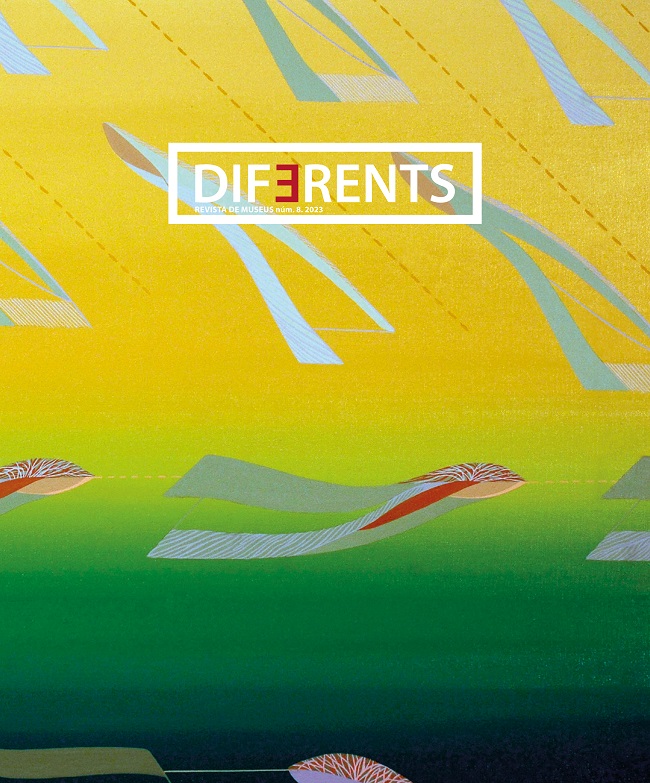Museums as Agents of Community Building in the City of Almeria. Analysis of the «Culture Served in Ceramics» Experience
Main Article Content
Abstract
This paper presents the main results of the «Culture served in ceramics» experience, developed in the city of Almería, with the involvement of different vulnerable groups in the museum environment. With this purpose, the objective is to analyze the impact that this community intervention project has had among its participants at an educational level. The methodology used was qualitative, through interviews and discussion groups. The participants were selected through non-probabilistic sampling, and for convenience. The results show that the attitudes of the beneficiaries of the program had a great impact regarding their cultural context, artistic, educational possibilities, as well as the creation of new social networks. It should be concluded that the initiative developed becomes an ideal proposal to establish a reference framework that favors a critical and participatory reflection from the museum space from groups at risk of exclusion.
Downloads
Article Details
References
Abad García, Emiliano (2023) «¿Quién quiere un museo? Memorias, conflictos e identidades en un mundo poscolonial», Hispania nova, 1: 127-156.
Abellán, Jorge y Nieves María Sáez-Gallego (2020) «Opiniones relativas a la inclusión de los alumnos con necesidades educativas especiales mostradas por futuros maestros de infantil y primaria», Revista Complutense de Educación, 31: 219-229.
Andreu i Abela, Jaime (2002) Las técnicas de análisis de contenido: una revisión actualizada, Sevilla: Fundación de Estudios Andaluces.
Bardín, Laurent (1996) Análisis de contenido (2ª e), Madrid: Akal.
Burgos, Claudia Viviana (2011) «La educación en los museus: de los objetos a los visitantes», Archivos de Ciencias de la Educación, 5: 271-290.
Canal Sur (2018) ¿Miras conmigo?. Disponible en https://www.facebook.com/MPDL.Almeria/videos/miras-conmigo-en-noticias-canal-sur-tv/1668839659818169/ [Fecha de consulta 16/10/2020]
Callejo Gallego, Javier (2002) «Observación, entrevista y grupo de discusión: el silencio de tres prácticas de investigación», Revista Española de salud pública, 76: 409-442.
Caride gómez, Jose Antonio (2005) «La animación sociocultural y el desarrollo comunitario como educación social», Revista de Educación, 336: 73-88.
Casanova Rodríguez, María Antonia (2005) «La interculturalidad como factor de calidad en la escuela», en Soriano Ayala, Encarnación (ed.) (2005) La interculturalidad como factor de calidad educativa, Madrid: La Muralla, 19-42.
Castejón Ibañez, Magdalena (2022) «El museo como catalizador cultural: una revisión desde la museología social, la educación no formal y la comunicación», Diferents. Revista de Museus, 7: 52-69. https://doi.org/10.6035/diferents.6463
Colás Bravo, María Pilar y Leonor Buendía Eisman (1992) Investigación educativa, Sevilla: Alfar.
Cordón Benito, David (2018) «Evolución conceptual del museo como espacio comunicativo», Estudios sobre el Mensaje Periodístico, 24: 485-500. https://doi.org/10.5209/ESMP.59962.
De Carli, Georgina (2008) «Innovación en museos: museo y comunidad en la oferta al turismo cultural», Rotur Revista de ocio y turismo, 1: 87-101. https://doi.org/10.17979/rotur.2008.1.1.127
García Sampedro, Marta y Sué Gutiérrez Berciano (2018) «El museo como espacio multicultural y de aprendizaje: algunas experiencias inclusivas», Liño: Revista Anual de Historia del Arte, 24: 117-128. https://doi.org/10.17811/li.24.2018.117-128
Gibbs, Graham (2012) El análisis de datos cualitativos en Investigación Cualitativa, Madrid: Morata.
González-Monfort, Neus (2019) «La educación patrimonial, una cuestión de futuro. Reflexiones sobre el valor del patrimonio para seguir avanzando hacia una ciudadanía crítica», El futuro del pasado: revista electrónica de historia, 10: 123-144. http://dx.doi.org/10.14516/fdp.2019.010.001.004
Hernández-Hernández, Francisca (2021) «El significado polisémico del concepto de museo», Complutum, 32: 417-425. https://doi.org/10.5209/cmpl.78568
Kelly, Lynda (2007) «Visitors and learning: adult museum visitors' learning identities», en Knell, Simon; Watson, Suzanne y Sheila Macleod (eds.) (2007) Museum revolutions: how museums change and are changed. UK: Routledge, 276-290.
Lavado Paradinas, Pedro Jose (2014) «La museología social: en y con todos los sentidos. Hacia la integración social en igualdad Social», en Domínguez Arranz, Almudena; García Sandoval, Juan y Pedro Lavado Paradinas (eds.) (2014) Actas del II Congreso Internacional Educación y Accesibilidad en Museos y Patrimonio. en y con todos los sentidos: hacia la integración social en igualdad. Universidad de Zaragoza: Máster en Museos: Educación y Comunicación, 37-57.
Marín, Jose (2002) «Globalización, educación y diversidad cultural», Perspectiva e espaço público 20: 223-512. https://doi.org/10.5007/%25x
Mayorga fernández, María Jose y Juan Carlos Tójar hurtado (2004) «El grupo de discusión como técnica de recogida de información en la evaluación de la docencia universitaria», Revista Fuentes 6: 1-15. Disponible en https://revistascientificas.us.es/index.php/fuentes/article/view/2419 [Fecha de consulta 14/10/2020]
Mejía Castillo, Harin Joel (2017) «La metodología de investigación evaluativa. Una alternativa para la valoración de proyectos», Revista Iberoamericana de Bioeconomia y Cambio Climático, 3: 734-744. https://doi.org/10.5377/ribcc.v3i5.5945
Oliveira, Tatiana (2020) «Museologia Social: em rede, em movimento, em coletivo e a experiência do Museu Vivo do São Bento», Cadernos de Sociomuseologia, 59: 25-52. https://doi.org/10.36572/csm.2020.vol.59.02
onu (1948) Declaración Universal de los Derechos Humanos. onu. Disponible en https://ihrf.world/es/declaracion-universal-de-los-derechos-humanos/ [Fecha de consulta 23/05/2020]
Pastor i Homs, María Inmaculada (2011) Pedagogía museística. Nuevas perspectivas y tendencias actuales, Barcelona: Ariel.
Rey-García, Marta et al. (2017) «Museología para la innovación social: una experiencia de regeneración territorial en la periferia europea», Revista para el análisis de la cultura y el territorio, 17: 115-131. https://doi.org/10.25267/Periferica.2016.i17.10
Ugena Candel, Tania y Santiago González D'ambrosio (2022) «Creando espacios de cultura inclusiva e igualitaria en el Museo Nacional del Prado: el proyecto sui géneris: arte, publicidad y estereotipos», en Arteterapia, Papeles de arteterapia y educación para inclusión social, 17: 85-96.
Zabala, Maríela Eleonora e Isabel Roura Galtés (2006) «Reflexiones teóricas sobre patrimonio, educación y museos», Revista de Teoría y Didáctica de las Ciencias Sociales, 11: 233-261. https://www.redalyc.org/articulo.oa?id=65201111.
Zacarés Pamblanco, Amparo Teresa (2021) «Museos en igualdad», Diferents. Revista de museus, 6: 28-45. http://dx.doi.org/10.6035/diferents.6096.


